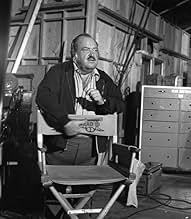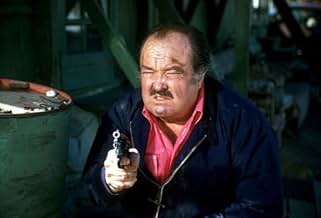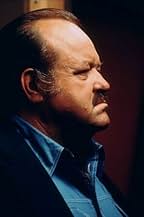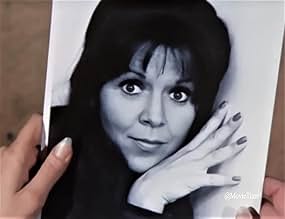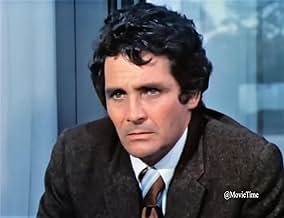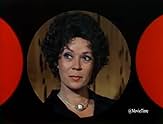IMDb-BEWERTUNG
6,8/10
3886
IHRE BEWERTUNG
Frank Cannon ist ein übergewichtiger, kahlköpfiger Ex-Cop mit tiefer Stimme und einem teuren Geschmack für kulinarische Genüsse; er wird ein hochpreisiger Privatdetektiv.Frank Cannon ist ein übergewichtiger, kahlköpfiger Ex-Cop mit tiefer Stimme und einem teuren Geschmack für kulinarische Genüsse; er wird ein hochpreisiger Privatdetektiv.Frank Cannon ist ein übergewichtiger, kahlköpfiger Ex-Cop mit tiefer Stimme und einem teuren Geschmack für kulinarische Genüsse; er wird ein hochpreisiger Privatdetektiv.
- Für 3 Primetime Emmys nominiert
- 2 Gewinne & 7 Nominierungen insgesamt
Folgen durchsuchen
Empfohlene Bewertungen
Unlike more recent detective series that are little more than an hour of car chases, graphic bomb scenes and other gratuitous violence, Cannon showed a detective carefully and cleverly going about the business of solving perplexing crimes. Moreover, unlike The Rockford Files and others which strain credibility by portraying a supposedly successful detective as always having trouble paying his bills, Cannon shows a very successful detective surrounded by the trappings of success such as a beautiful Mark IV and an expensive penthouse apartment. All in all a great series.
I agree, I think Cannon was one of the best series ever made. The early 70's era was the best for guest stars, and Cannon had its share of famous actors. It was about something different every time. Cannon carried a gun, but he could also disarm a enemy with either a fist or a menacing sneer. The series hasn't been on in my area in a few years, yet I still remember particular episodes in great detail. I put the show on the level of Columbo, which was another series put together with great care. You can see the same episode several times over, and still not be bored. Also, there are a few episodes you need to see a few times to really get them. This is quality, something Quinn Martin did so well.
I agree with the others about the quality and the care that each episode of Cannon had. A memorable TV show that only ended because William Conrad grew tired of doing it and wanted to end it on a high note. There was a "reunion" TV movie called "The return of Frank Cannon" done around 1980 as I recall. Perhaps it will see the light of day again in reruns.
Why hasn't anyone reproduced this series for sale by season?? I know many people that would buy it as it was a fantastic show. Possibly one of the best series ever. The show had character, and great action. The star William Conrad was so believable. Yet they produce old shows like "I married Joan" from the early 50's and not this one in color from the 70's. I don't understand. This show, CANNON, and The Rockford Files, and Mannix are just not available for sale by anyone that I can find. I have often wondered if someone, the producer or maybe even William Conrad had a rider in their contract that these shows could not be re-sold?? Does anyone know??
"Cannon", one of the many gimmick-driven series produced by Quinn Martin Productions in the 60s and 70s, was an inspiration for every 'weight-challenged' fan who ever fantasized of chasing down bad guys, solving crimes, and even, occasionally, winning the girl. The series' star, short, rotund William Conrad (as Frank Cannon), suffers the humiliation of being discharged by the police for being overweight, yet has the last laugh, as he frequently solves cases law enforcement agencies have given up on.
William Conrad (1920-1994) had built a long career around his low, powerful voice, and was best-known for his radio work as the original 'Matt Dillon' in the long-running series, "Gunsmoke" (the role James Arness would inherit, when the series moved to television). A successful character actor in many films of the forties and fifties (including a flashy role as Kasar, one of John Wayne's brothers, in the infamous THE CONQUEROR), the bulk of Conrad's TV work, prior to "Cannon", was as an off-screen narrator ("Rocky and Bullwinkle", "The Fugitive", "The Invaders"). "Cannon" was created specifically for Conrad, not only acknowledging his physical stature, but his skills as a chef, his occasionally prickly temperament, and his child-like joy of solving puzzles. Living well in a beautiful balconied apartment, he still spent most of his time behind the wheel of his sedan, en route to another case requiring his special skills.
With a bouncy, upbeat theme song (featuring a tuba, yet another 'reference' to his girth), "Cannon" was a lighter series than "Mannix" or "Barnaby Jones", but still provided occasional opportunities for Conrad to use his fists, and to even do a climactic foot chase, or two (the least believable moments of the series!).
While the actor would enjoy another successful detective series, as the more abrasive, slovenly 'J.L.' McCabe, in "Jake and the Fatman", "Cannon" remains Conrad's best-loved role, and a popular series in syndication, to this day.
William Conrad (1920-1994) had built a long career around his low, powerful voice, and was best-known for his radio work as the original 'Matt Dillon' in the long-running series, "Gunsmoke" (the role James Arness would inherit, when the series moved to television). A successful character actor in many films of the forties and fifties (including a flashy role as Kasar, one of John Wayne's brothers, in the infamous THE CONQUEROR), the bulk of Conrad's TV work, prior to "Cannon", was as an off-screen narrator ("Rocky and Bullwinkle", "The Fugitive", "The Invaders"). "Cannon" was created specifically for Conrad, not only acknowledging his physical stature, but his skills as a chef, his occasionally prickly temperament, and his child-like joy of solving puzzles. Living well in a beautiful balconied apartment, he still spent most of his time behind the wheel of his sedan, en route to another case requiring his special skills.
With a bouncy, upbeat theme song (featuring a tuba, yet another 'reference' to his girth), "Cannon" was a lighter series than "Mannix" or "Barnaby Jones", but still provided occasional opportunities for Conrad to use his fists, and to even do a climactic foot chase, or two (the least believable moments of the series!).
While the actor would enjoy another successful detective series, as the more abrasive, slovenly 'J.L.' McCabe, in "Jake and the Fatman", "Cannon" remains Conrad's best-loved role, and a popular series in syndication, to this day.
Wusstest du schon
- WissenswertesFrank Cannon was a pipe smoker. He was shown with a pipe in the first two seasons but it was seen occasionally in the third and fourth season before it was subsequently dropped altogether. In reality, William Conrad was a pipe smoker.
- PatzerCannon frequently uses his mobile phone in his car but exterior shots of the car never shows the necessary antenna.
- Zitate
[repeated line]
Frank Cannon: My name's Frank Cannon, I'm a private investigator.
- Crazy CreditsIn all five seasons, the credits are shown in capital and lower case letters.
- VerbindungenFeatured in The 25th Annual Primetime Emmy Awards (1973)
Top-Auswahl
Melde dich zum Bewerten an und greife auf die Watchlist für personalisierte Empfehlungen zu.
Details
- Erscheinungsdatum
- Herkunftsland
- Offizieller Standort
- Sprache
- Auch bekannt als
- Кеннон
- Drehorte
- Sunset Tower Hotel - 8358 Sunset Blvd, West Hollywood, Kalifornien, USA(Cannon's apartment)
- Produktionsfirmen
- Weitere beteiligte Unternehmen bei IMDbPro anzeigen
Zu dieser Seite beitragen
Bearbeitung vorschlagen oder fehlenden Inhalt hinzufügen


